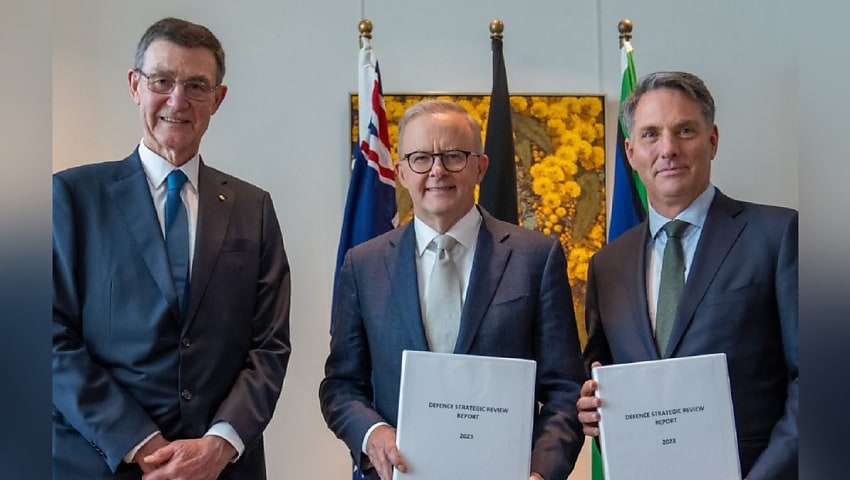Defence Minister Richard Marles has revealed the Albanese government’s response to the review into the Defence Trade Controls Act 2012, marking major reforms for Australia’s defence trade legislation.
To continue reading the rest of this article, please log in.
Create free account to get unlimited news articles and more!
Led by Peter Tesch, former deputy secretary in the Department of Defence, and Professor Graeme Samuel AC, former president of the National Competition Council, the review is required under legislation every five years to ensure Australia’s export control regime remains fit for purpose, balancing appropriate safeguards with a rapidly evolving strategic environment.
As part of this, the independent co-leads undertook consultations with key stakeholders across government, industry, and academia.
Deputy Prime Minister and Defence Minister Marles said, “The review and its recommendations have been informed by extensive engagement with key stakeholders across government, academia, and industry, and will help strengthen Australia’s export controls system.”
The review made 10 recommendations aimed at improving Australia’s export control regime, including streamlining processes, giving consideration to the penalty regime, and improving outreach and education about the framework, including:
- Recommendation 1: Taking into account the proposed amendments in the Defence Trade Controls Amendment Bill 2023 (DTC Amendment Bill), the DTC Act should be adjusted to include an overarching provision covering the supply of goods, technology, and related services that may prejudice Australia’s national interest but are not captured on the Defence and Strategic Goods List (DSGL).
- Recommendation 2: The Department of Defence (Defence) should maintain regular, pre-emptive outreach and education of stakeholders about emerging threat vectors and technologies of concern, including through a national network of accredited export control compliance advisers in key academic institutions, businesses, and peak bodies, to enhance a sense of shared responsibility for compliance with the DTC Act and preventing damage to the national interest.
- Recommendation 3: Defence should closely engage with key stakeholders to co-design and maintain up-to-date granular criteria that help stakeholders understand the application of the DTC Act and their compliance obligations and attendant processes. This should be supported by an evolving suite of guidelines and case studies that will help inform initial self-assessment, such that approaches to DEC for guidance are mature, detailed, and facilitate swift responses.
- Recommendation 4: In close consultation with stakeholders, especially universities, Defence should develop and implement an accreditation system to build and maintain a cadre of export control compliance advisers, whose credentials will be regularly assessed and may be revoked if required.
- Recommendation 5: Penalties for breaches of the DTC Act should be significant to operate as an effective deterrent for deliberate, reckless or negligent acts. The penalties should be scaled to reflect the seriousness of the breach and culpability of the perpetrator. Examples of an appropriate penalty regime can be found in the Competition and Consumer Act 2010 and the Corporations Act 2001.
- Recommendation 6: Defence should be given enhanced monitoring and investigative powers to invigilate and enforce compliance with the DTC Act and should ensure that properly trained staff are allocated to exercise these powers.
- Recommendation 7: Subject to consideration of the DTC Amendment Bill, the current brokering provisions of the DTC Act should be amended to ensure that the DTC Act applies regardless of how or where the supply of DSGL, or non-DSGL goods, technology and related services occurs.
- Recommendation 8: Defence should implement measures to streamline the permit application process and the need for multiple, individual permits across the DTC Act and the Customs Act 1901.
- Recommendation 9: Subject to consideration of the DTC Amendment Bill, Defence should amend the current definition of “basic scientific research” to better align with the US definition of “fundamental research”, encompassing activities that ordinarily result in publishing.
- Recommendation 10: Defence should establish a mechanism to facilitate greater awareness and engagement on complex applications at senior levels of government. The mechanism can create closer collaboration to support Defence and other agencies, including the Department of Foreign Affairs and Trade, in managing and adjudicating more complex or sensitive applications.
“I thank Peter Tesch and Professor Graeme Samuel for their time, effort and extensive consultation in reviewing the act. The Albanese government is committed to ensuring the Australian export control regime remains fit for purpose in a rapidly evolving strategic environment,” Marles added.
The government agreed to recommendations 2, 3, 4, 8, and 10, while it agreed in-principle to recommendations 1, 5, 6, 7, and 9.
The government will continue to work closely with relevant stakeholders, including industry and academia to implement the review’s recommendations. The government will implement the key recommendations alongside the forthcoming reforms to the Defence Trade Controls Act 2012.

 Login
Login






